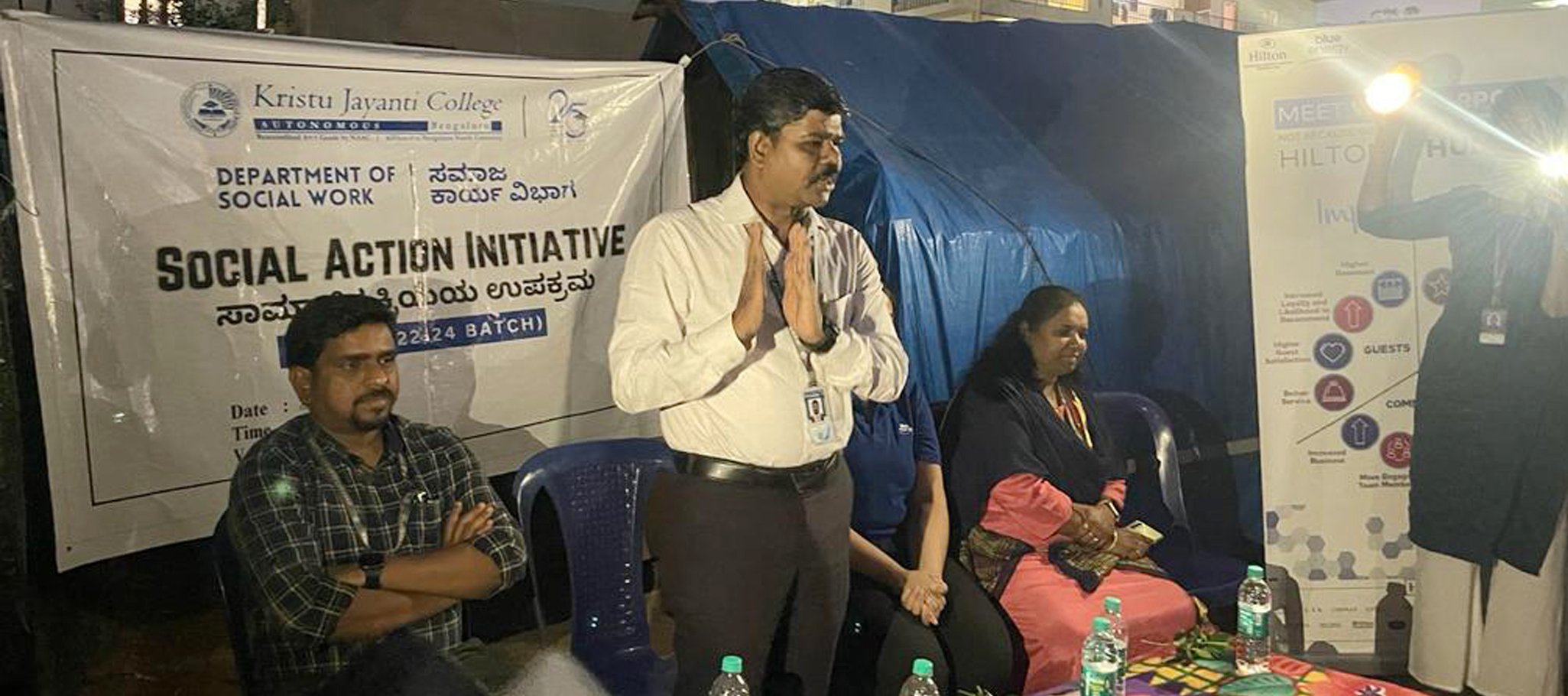
International Lecture Series
Lecture on Evidence Based Social Work PracticeInternational Lecture on Value Informed Social Work Practice
Date: 25 January 2025
The Department of Social Work, Kristu Jayanti College, Bengaluru organized an insightful International Lecture on "Value-Informed Social Work Practice", delivered by Dr. Kelly Glubb Smith, Senior Lecturer & Social work Convenor, University of Waikato, New Zealand on 18th of January 2025. She is an esteemed expert from the Social Work field. The lecture aimed to enhance students’ understanding of the core values of social work and its diverse areas of practice. And it was an effort to provide an exposure to the students on global teaching.
Dr. Kelly Glubb Smith emphasized the fundamental values that guide social work practice, including empathy, integrity, respect for human dignity, and social justice. She discussed the role of ethics in addressing complex social issues and ensuring professional accountability. The session covered various fields within social work, such as mental health, child welfare, community development, healthcare, and advocacy. Dr. Smith provided insights into international best practices, highlighting the importance of cultural competence and evidence-based interventions. She also showed a video of University of Waikato to the students.
The lecture concluded with a Q & A session, where students engaged in meaningful discussions about career prospects and real-world applications of social work principles. The session was highly enriching, offering students valuable knowledge and a deeper appreciation for the profession. Dr. Kelly Glubb Smith’s expertise and engaging delivery made the lecture a memorable experience. The event was well-received, and students expressed their gratitude for the opportunity to gain international perspectives on social work practice. The session was well coordinated by the Student Coordinators. And ended up with a vote of thanks.
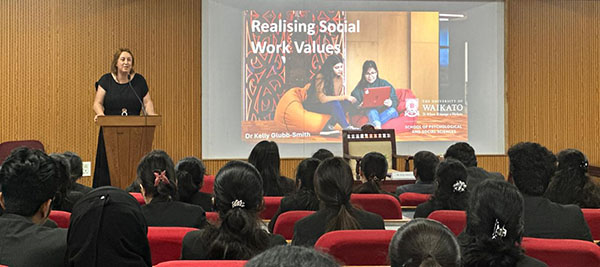
International Lecture on Value Informed Social Work Practice
Date: 18 January 2025
The Department of Social Work, Kristu Jayanti College, Bengaluru organized an insightful International Lecture on "Value-Informed Social Work Practice", delivered by Dr. Kelly Glubb Smith, Senior Lecturer & Social work Convenor, University of Waikato, New Zealand on 18th of January 2025. She is an esteemed expert from the Social Work field. The lecture aimed to enhance students’ understanding of the core values of social work and its diverse areas of practice. And it was an effort to provide an exposure to the students on global teaching.
Dr. Kelly Glubb Smith emphasized the fundamental values that guide social work practice, including empathy, integrity, respect for human dignity, and social justice. She discussed the role of ethics in addressing complex social issues and ensuring professional accountability. The session covered various fields within social work, such as mental health, child welfare, community development, healthcare, and advocacy. Dr. Smith provided insights into international best practices, highlighting the importance of cultural competence and evidence-based interventions. She also showed a video of University of Waikato to the students.
The lecture concluded with a Q & A session, where students engaged in meaningful discussions about career prospects and real-world applications of social work principles. The session was highly enriching, offering students valuable knowledge and a deeper appreciation for the profession. Dr. Kelly Glubb Smith’s expertise and engaging delivery made the lecture a memorable experience. The event was well-received, and students expressed their gratitude for the opportunity to gain international perspectives on social work practice. The session was well coordinated by the Student Coordinators. And ended up with a vote of thanks.
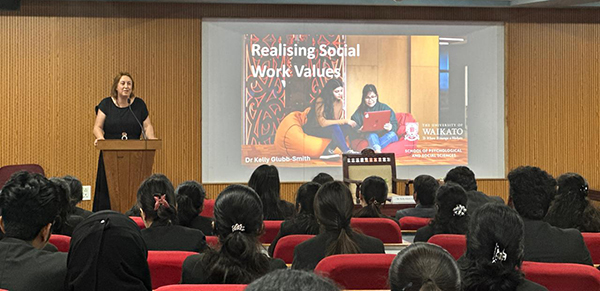
International Lecture on Essential Skills for becoming a Global Social Worker
Date: 30 October 2024
The Department of Social Work, Kristu Jayanti College organised an International Expert Lecture on Essential Skills for Becoming a Global Social Worker on 30th October 2024. The objective of the lecture was to provide an insight to the students on essential skills to become a Global Social Worker. The Resource person Mr. Samuel Mammen, Programme Director, Oak Hill Ranch, Canada addressed the students on Canadian Code and Ethics of Social Work Practice. He also pointed out the skills and techniques of Social Work practices in abroad. He also presented the scope of Social Work in Canada and abroad. The programme was well executed by the Students Coordinators. The lecture was an interactive one.
The lecture was ended up with a question answer round, where the students have clarified their doubts by raising the issues on Clinical practices, role of Medical Social Worker, counsellor and areas of intervention. The resource person along with his team members from Canada have attended the lecture. The lecture session went on well and successful with the cooperation of faculties of Department of Social Work.
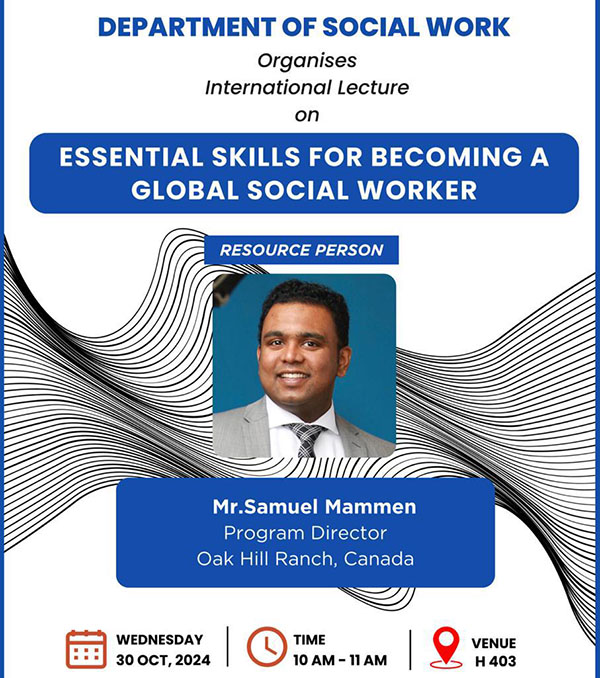
Kristu Jayanti Nobel Prize Lecture Series on Nobel Peace Prize 2024
Date: 15 October 2024
The Department of Social Work, Kristu Jayanti College, Bengaluru organised a Nobel Prize Lecture series on Nobel Peace Prize 2024 on 15th October 2024. The objective of the lecture series was to unite voices to achieve a world free of nuclear weapons. The moderator for the panel discussion was Dr.Lyola Thomas, Associate Professor, Department of English, Kristu Jayanti College, Bengaluru. The formal session commenced at 2:00 PM, with Ms. Fathima Hannath, the Emcee, welcoming everyone and sharing the significance of the Nobel Peace Prize and its relevance to global nuclear disarmament efforts.
The discussion covered a range of topics including The Impact of Hibakusha Voices, Historical and Contemporary Perspective on Nuclear Taboo, Commemorating 80 years since Hiroshima and Nagasaki, Nihon Hidankyo and Global Peace Movements, Youth Engagement in Nuclear Disarmament and A world without Nuclear Weapons. Each segment provided an in-depth exploration of the historical context, present challenges, and future possibilities surrounding nuclear disarmament. The students effectively engaged the audience, highlighting the role of global peace movements, youth activism, and the importance of honoring the legacy of the Hibakusha in the ongoing fight for a nuclear-free world.
Following the presentation by the speakers, the esteemed moderator, Dr. Lyola Thomas appreciated the spekaers for their enthusiasm and vehemtly raising their voices for a nuclear free world. She also shared her thoughts, emphasizing the responsibility of social workers to raise their voices as ambassadors for human rights and peace. The panel discussion was a valuable addition to the Kristu Jayanti Nobel Peace Prize Lecture Series, successfully raising awareness on nuclear disarmament and fostered a spirit of activism and advocacy among the students.
Lecture on Evidence Based Social Work Practice
An International Lecture on Evidence Based Social Work was organized by the Social Work Department on 22nd November 2019. The resource person was Dr. Esther Coren, Reader and Associate Director of Research, Canterbury Christ Church University
The lecture began with an invocation by the department choir. Ms. Shoby P S, Student Representative, officially welcomed the gathering. Dr. Jonas Richard A., Head, Department of Social Work, gave a prelude to the session and detailed the objectives of the lecture series.
Miss Jeffine Joseph, Student Representative, introduced Dr. Esther Coren, Reader and Associate Director of Research, Canterbury Christ Church University, UK.
Dr. Esther Coren, in her session highlighted the connection between research and practice. She also shared the vital statistics related to increasing number of cases related to evidence based practices. She also explained in detail the Historical evolution of Evidence Based Practice, the issues and problems with social work and social care. The best of the lecture was she drew examples from Indian context Dr. Esther winded up the lecture stating the significance of Specific focused research questions, evaluations of specific interventions and issues in evidence based social work.
The session ended with the vote of thanks by Ms Juby Johnson, Student Representative, followed by the Jayantian Anthem.
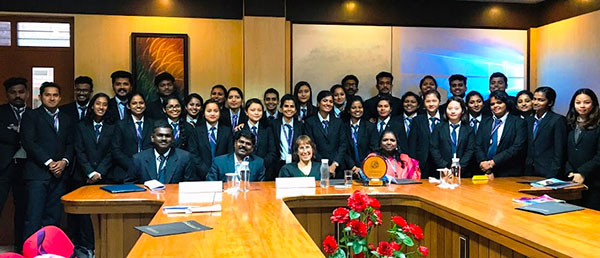
Social Innovation Lecture on Field Education
The Department of Social Work organized a Social Innovation Lecture on Field Education, for the II Semester MSW students on 7th January, 2019. The Resource person for this program was Fr. Panthackal Rubin SDB, Director, Bangalore Omiyavara Seva Coota (BOSCO). BOSCO is a Non-Governmental Organization working with the Young at Risk in the city of Bangalore.
The program began with an invocation song followed by a welcome address by Ms. Liya Lopez (II Semester MSW). Dr. Jonas Richard A. (Head, Department of Social Work) welcomed the guest and stressed the importance of applying the theories into practice through Field Education, as it is critical for students to help them acquire, practice, and improve the values, skills, and knowledge needed for the profession
Fr. Rubin initiated the lecture on how to apply social work methods in the situation of given individuals, groups or communities. He further stressed the field work trainees to acquire significant substance substitute knowledge in the specified field of practice characterized by the agency. Fr. Rubin asked the trainees to obtain social work knowledge and encouraged them to use different social work methods, skills & technique in the field.
Father concluded the session by highlighting the importance of knowing the field work objectives, followed by a vote of thanks by Ms. Jereena Jacob (II Semester MSW).
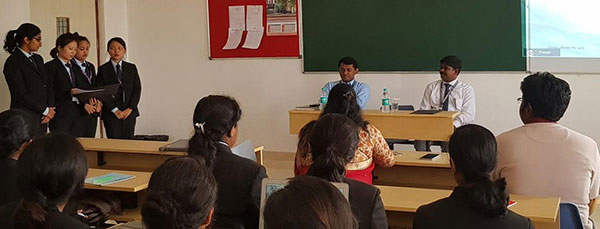
Social Innovation Lecture on Economic Rights and SDG-1
The Department of Social Work organized a Social innovation lecture on Economic Rights and SDG-1 (No Poverty) for the 4th semester students on 13th of December, 2018. Mr. R. Manohar, Executive Director-CARE was the resource person.
The session began with a prayer song and followed by welcome by Dr. Emmanuel Daniel, Assistant Professor, Department of Social Work. Mr. Ajith C Thomas, a student representative introduced the speaker to the participants. The session was then handed over to Mr. Manohar who began the lecture by introducing the students to the concept of sustainable Development Goals and its necessity. He said the motivation behind the introduction of the sustainable development goals was to improve the living condition of people all over the world. His next focus was on the issue of economic rights and its relationship with the first SDG. He stated that the attainment of SDG 1 or no poverty would automatically ensure that the people achieved their economic rights such as the right to work and right to a decent livelihood. He said that one of the main targets of the first sustainable development goal was to reduce at least by half, the proportion of men, women and children of all ages living in poverty in all its dimensions according to national definitions by the year. He said that there was an inter-relationship between the sustainable development goals and the international covenant on economic, social, and cultural rights. Both of these were aimed at ensuring that people’s economic rights were not violated.
He concluded the lecture by stating the importance awareness on the first sustainable development goal, that is-no poverty and the strategies to achieve that goal. The vote of thanks was proposed by Ms. Deepika Annama Thomas, a student representative and a memento to appreciate the contribution made by the resource person was presented to him by Dr. S. Rama Gokula Krishnan, Assistant Professor, Department of Social Work, Kristu Jayanti College. Overall, it was a very fruitful learning experience for the participants.
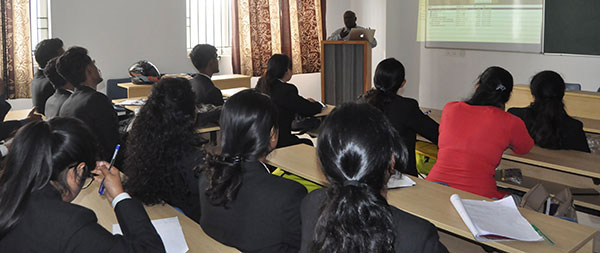
Social Innovation Lecture on Soft-Skills for Social Work Professionals
As part of the social innovation lecture series, the Department of Social Work organized a lecture on Soft-Skills for Social Work Professionals for the 2nd Semester students of the department on 13th of December, 2018. Dr. G. Robert Clive, Associate Professor, Department of Social Sciences, Crossland College, Brahmavar, Udupi was the resource person.
The term soft skills refers to the personal traits, characteristics and competencies that inform to how an individual relates to others and is often used as a synonym for people skills or interpersonal skills. The programme commenced with a prayer song by the department choir. Mr. James Binu Chacko, a student representative welcomed the resource person and the gathering, followed by the welcome address by Ms. Jeffine J Joseph who also introduced the resource person to the participants. Dr Robert began the lecture by quoting Dalai Lama’s words which says “If you want others to be happy, practise compassion. If you want to be happy, practise compassion”. He emphasised the importance of being compassionate in our day-to-day lives. He highlighted the importance of maintaining good interpersonal relationships and briefed soft skills like empathy, trustworthy, team spirit, assertiveness, self-confidence, mindfulness, communication, inquisitiveness and creativity. He threw light on the importance of right attitude towards life and the willingness to change in order to be successful. Dr Robert also shared valuable tips to be followed while attending interviews. The session was made educative through power point presentations and group activities. The speaker ended the session by suggesting some books for the students to read and reflect upon. The lecture concluded with the vote of thanks by Miss. Maria Jose, a student representative.
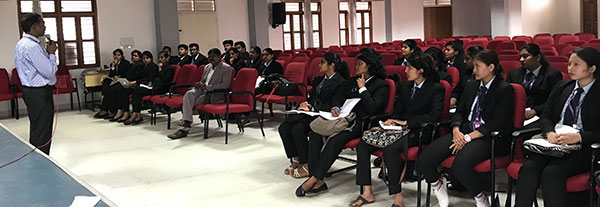
Social Innovation Lecture on Health: Human Rights Perspective
The Department of Social Work organised a Social Innovation Lecture on Health: A Human Rights Perspective by Bro. Albert Xaviour SHJ, Executive Director, Brothers Integrated Rural Development Society (BIRDS) and an International Human Rights Educator for the III semester MSW students on 4th August, 2018.
The program started at 10: 30 am with a welcome address by Ms Mariya Joy (III Sem MSW), and Dr Jonas Richard A., Head, Department of Social Work gave a brief outline about Human Rights and stressed its need in the field of Health.
Bro Albert started his session by explaining to the students the connection between health and human rights. He further remarked that people in India need to understand that not having a healthy life is a violation of Human Rights. Bro. Albert further discussed the 30 rights as mentioned in The Universal Declaration of Human Rights (UDHR) and explained about the bills and The Convention on the Elimination of All Forms of Discrimination against Women (CEDAW).
Bro. Albert had an interactive session with the students who clarified their doubts on the UN and its contribution in promoting Human Rights among the countries. Bro. Albert concluded the session, stressing on the importance of Human Rights in the field of healthcare to help in promoting justice and equality to every person. The program came to a close with a vote of thanks by Ms Aishwarya MK (III Semester MSW) while Dr. Winnie Joyce presented the memento to the speaker.
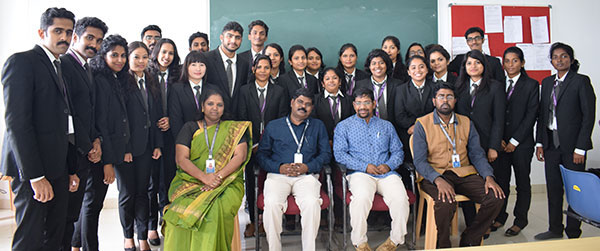
Social Innovation Lecture on Child Protection Policy
The Department of Social Work organized a Social Innovation Lecture on Child Protection Policy for the III Semester MSW students on 2nd July, 2018. The Resource person for this program was Fr. Panthackal Rubin SDB, Director, Bangalore Omiyavara Seva Coota (BOSCO). BOSCO is a Non-Governmental Organization working with the Young at Risk in the city of Bangalore like – children living on the streets, child labourers, abandoned/ orphaned children, victims of drug abuse, begging children, rag pickers, etc. since 1980.
The program started with the welcome address by Hisham Ali (III Semester MSW) and Dr. Jonas Richard (Head, Department of Social Work) welcomed the guest and stressed the importance on the knowledge of Child Protection Policy for Social Work Professionals.
Fr. Rubin started his session by screening a video about the life of a girl child named “She” where the hardships of a girl child were depicted. Fr. Rubin gave a summary of the different laws and the rights of the children as mentioned in the Constitution of India. In addition to that, Fr. Rubin explained the objectives of the Child Protection Policy, its guiding principles and the code of conduct.
Fr. Rubin and the students had a discussion about the policies and laws relating to the child protection in India. Ms Annamma Thomas (III Semester MSW) proposed the vote of thanks and the memento was presented by Dr. Winnie Joyce A. (Faculty, Department of Social Work).
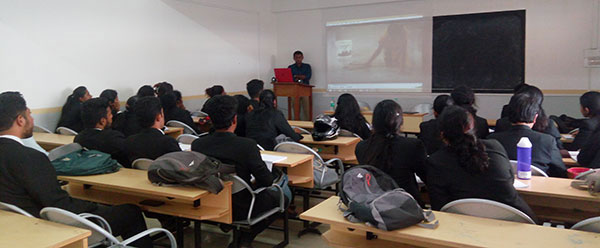
Cyber ethics- A Social Work Perspective
As part of the International Lecture Series, the Department of Social Work organized a lecture on ‘Cyber ethics- A Social Work Perspective’ on 16th February 2018. The expert speaker for the lecture was Mr. Abhishek Clifford Jacob, Chief Executive Officer, RESCUE, Mysore. Mr. Justin K Jose, student of II MSW delivered the welcome address and Dr. Jonas Richard A, Head of the Department of Social Work felicitated the gathering and addressed the need and importance of cyberethics in the fast growing world of technology.
The word cyber ethics refers to a code of safe and responsible behavior for the Internet user community. Practicing good cyber ethics involves understanding the risks of harmful and illegal behavior online and learn how to protect ourselves, and other Internet users, from such behavior. It also involves teaching young people that may not realize the possible for harm to themselves and others, that use the Internet safely and responsibly
The session began with a visual representation of a film trailer which exhibited the extremity of girls who are trafficked and are abused in the Western countries. The resource person mentioned the four giants faced in the worlds today which are the mass gang rape of teenage girls, baby genocide, advertising rape and 37 million deaths of secret World War III. Human trafficking is considered as the second largest criminal activity. The solution for all these kind of callous activity is cyberethics.
The suitable remedies which can be suggested for all these acts can be strengthening the media campaigns, conducting PTA meetings in educational institutions, introducing parental software, blocking the porn websites across the country.
The discussion ended with the question and answer session where the students raised their queries about the implementation of rules and regulations, remedies for human trafficking and the importance to eliminate such social issues from the society. The program ended with a vote of thanks by Ms. Aishwarya Aravind, student of I MSW.

Corporate Social Responsibility
As part of the Choice Based Credit System (CBCS), the Department of Social Work organized an expert lecture on Corporate Social Responsibility (CSR) for all the second year Post Graduate students who have chosen Corporate Social Responsibility (CSR) as a part of Choice Based Credit System (CBCS) program on 31st August 2017. The guest speaker of the day was Shri. Purushotham Rao, Group Manager (CSR), Aditya Birla Group.
The expert lecture began with an invocation by the choir and followed by welcome by Ms. Sophia Banu, the student coordinator. The guest was introduced by Dr. Jonas Richard A, who emphasised on the importance of expert lectures to supplement with the theoretical inputs given in the class room. During his address, Mr.Rao stressed on the different dimensions in CSR and the core activities undertaken by Aditya Birla Group in Bangalore. He also advised that in a world of new innovation and technologies, it is very important to have the social concern in our customary activities because being with people and socialising with people will facilitate in understanding them closer. He also underlined the importance of being open to the needs of the society and people.
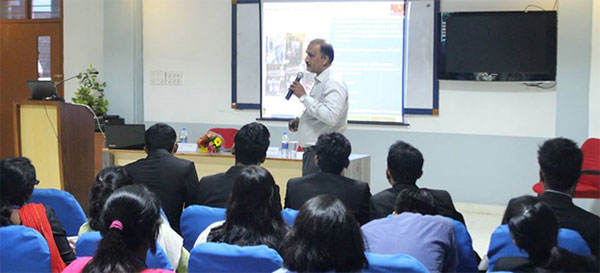
Child Protection and Advocacy
An International Lecture Series on Child Protection and Advocacy was organised by the Department of Social Work on 6th February 2017. Dr. Valentina Calcaterra, Researcher & Social Worker, Catholic University of Milan, Italy address the students on this topic.
Dr. Valentina Calcaterra introduced the concept of Relational Approach in Social Work. The approach aims at engaging existing networks of individuals with problems to enhance their resilience and capacity to resolve difficulties. The highlighted feature of the approach is that it engages, mobilises and develops both supportive and problem- solving networks as mentioned by the speaker. She stated that the term network refers to family members, friends, teachers and any other significant factors who have a contribution to make in problem- solving.
The speaker elaborated the process of placing children under foster care through family group conference and assessments done by the Social Worker. The various questions regarding the difference between Social Work practice in Italy and India, family group conference, problems faced by youth in Italy, measures to prevent sexual abuse among children, challenges faced by Social Workers in Italy and the role of National Social Work Council of Italy were discussed.
Social Work Licensing in Australia
The Department of Social Work organized an international lecture series on the topic Social Work Licensing in Australia on 16 February 2017. The lecture aimed at educating the students on the scope of Social work and on the various requirements of a Social Worker to work in Australia. Mr. Jomet Mani, Managing Director, YESTE Migration Counseling, Australia was the resource person.
Mr. Mani highlighted that field work and internship hours are significant and their successful completion could result in enriched practical knowledge and increased opportunity to work abroad. He briefed the students on the migration procedure and the skill requirements of a Social Worker in Australia.
Mr. Mani suggested that registration in the Australian professional bodies of Social Work like Australian Association of Social Work (AASW) and Australian Community Workers Association (ACWA) could guide aspiring Social Workers on migration to Australia. Further the various roles played by such professional bodies were discussed.
Understanding Social Withdrawal of Young People in Hong Kong
The Department of Social Work organized an international lecture series on Understanding Social Withdrawal of Young People in Hong Kong on 16 February 2017. The expert lecture aimed to enlighten the participants on the various Social issues faced by the migrant youth in Hong Kong and the professional services provided to them by Don Bosco South Asian Youth Services. Rev. Fr. Dolphie Sequirra Director, Don Bosco South Asian Youth Services, Hong Kong gave insight about the issue.
Fr. Sequirra stated that minorities the South Asian community were the vulnerable population. The critical aspects on the social issues such as discrimination, racism, economic deprivation, social degradation, unemployment, cultural differences, inequality in treatment, stereotyping faced by t ethnic minorities. Fr. Sequirra concluded that it is important to embrace diversity and accommodate and accept multiculturalism. The speaker was delighted to clarify doubts of students regarding the activities of youth in DB-SAYS, reason for migration from India and recent policies for the welfare of the migrants.

